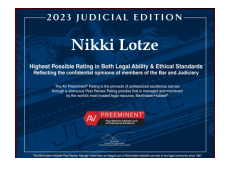At Lotze Mosley, LLP, our criminal defense attorneys in Washington D.C. and Maryland explain to each of our clients how the different stages of criminal prosecution work, so they understand their Constitutional Rights and can make informed decisions about the direction of their cases.
The stages of criminal cases unfold as follows.
An Arrest Occurs
When an individual is arrested for a crime perceived or actual — based on an officer having probable cause, witnessing the crime, or under the authority of a warrant, he or she will be processed, booked, and placed in custody.
Depending on the charges, the suspect can be released on their own recognizance, or granted bail, which he or she may pay in exchange for release.
Arraignment
Arraignment is a formal reading of criminal charges in the presence of the defendant the person who was arrested — to inform him or her of the charges against them.
The accused is expected to enter a plea at the time of the arraignment based on the probable cause/evidence available in the case.
Pre-Trial Motions
Pre-trial motions give both parties — the defense team and the prosecutors an opportunity to determine or disprove whether the evidence and testimony available are admissible at trial.
If the necessary evidence or testimony is not available to proceed, the defense attorney may ask the judge to dismiss the charges outright.
Based on the information presented, or at some point before or during the trial, a plea agreement may be arranged between the defense and the prosecution that allows the defendant to plead guilty to reduced charges in exchange for a more lenient sentence.
Criminal Trial
If the charges are not dismissed, and an agreement cannot be reached, a trial including opening and closing statements, examinations and cross-examinations of witnesses and evidence — a judge or jury will make a final decision regarding the defendant’s fate and whether he or she is guilty or not guilty.
The prosecution must prove beyond a reasonable doubt that the defendant committed the crime they have been charged with.
If the jury is unable to reach a unanimous verdict, the judge may declare a mistrial.
That means the case will either be dismissed, or a new jury will be selected.
If a jury or judge finds the defendant guilty, the court will provide a sentence.
Sentencing
The court will determine the appropriate punishment for the convicted defendant.
The individual’s criminal history and nature and severity of the crime will be considered by the judge when deciding a sentence.
The Appeal Process
When an individual is convicted of a crime, he or she has the right to request an appeal through a higher court.
If that court finds out that there was an error in the case or the sentence imposed, the court may reverse the conviction or decide that the case needs to be retried.
If you have been charged with a crime and would like to know more about your legal rights and options, contact our experienced criminal defense attorneys in Washington D.C. and Maryland at Lotze Mosley, LLP to determine the best course of action for your unique case by calling (202) 393-0535 today.













